Imagine yourself plunged into the gritty, grimy underbelly of Fight Club, a cinematic world that irreverently slashes through the glossy façade of the self-help industry.
You’ve likely never given much thought to how this cult classic film serves as a scathing critique of the quick-fix, feel-good promise peddled by many self-help gurus, have you?
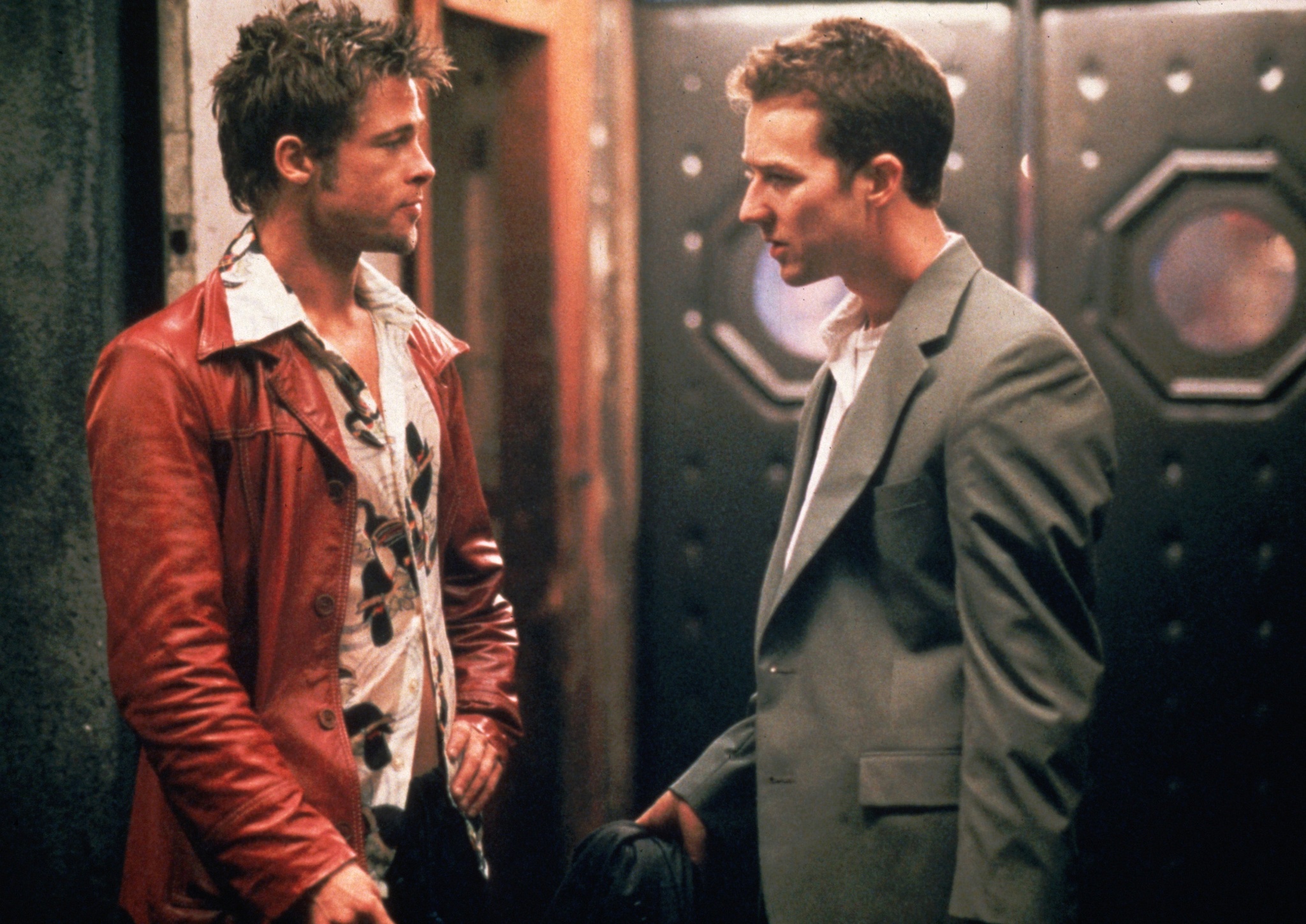
Let’s dissect and evaluate the film’s portrayal of self-improvement and its satirical take on the industry’s often oversimplified advice.
There’s a rabbit hole to descend here – one that forces us to question our own beliefs about self-help. Ready to step in and uncover the truth?
Key Takeaways
- Fight Club boldly satirizes the self-help industry’s empty promises and quick-fix solutions.
- It challenges the authenticity and effectiveness of self-help gurus.
- The film critiques the misguided pursuit of self-improvement through self-help programs.
- It encourages viewers to question and think beyond the glossy veneer of the self-help industry.
Fight Club’s Critique on Consumerism

Diving headfirst into the murky waters of materialism, Fight Club delivers a scathing critique on our modern culture of consumption, exposing the soul-crushing emptiness that often accompanies the pursuit of possessions. You see, in the movie, the protagonist’s life gets dominated by consumer culture. His desire for the perfect condo, swanky clothes, and sleek gadgets, all products of marketing influence, only leads to a feeling of hollowness.
The film artfully showcases the irony of our culture’s obsession with material things, emphasizing that they don’t grant happiness. Instead, they often breed discontent, as you’re always chasing the next big thing. Through its unflinching portrayal of consumerism, Fight Club serves as a wake-up call, urging you to question the status quo and challenge the culture of consumption.
Materialism and Disillusionment in Fight Club
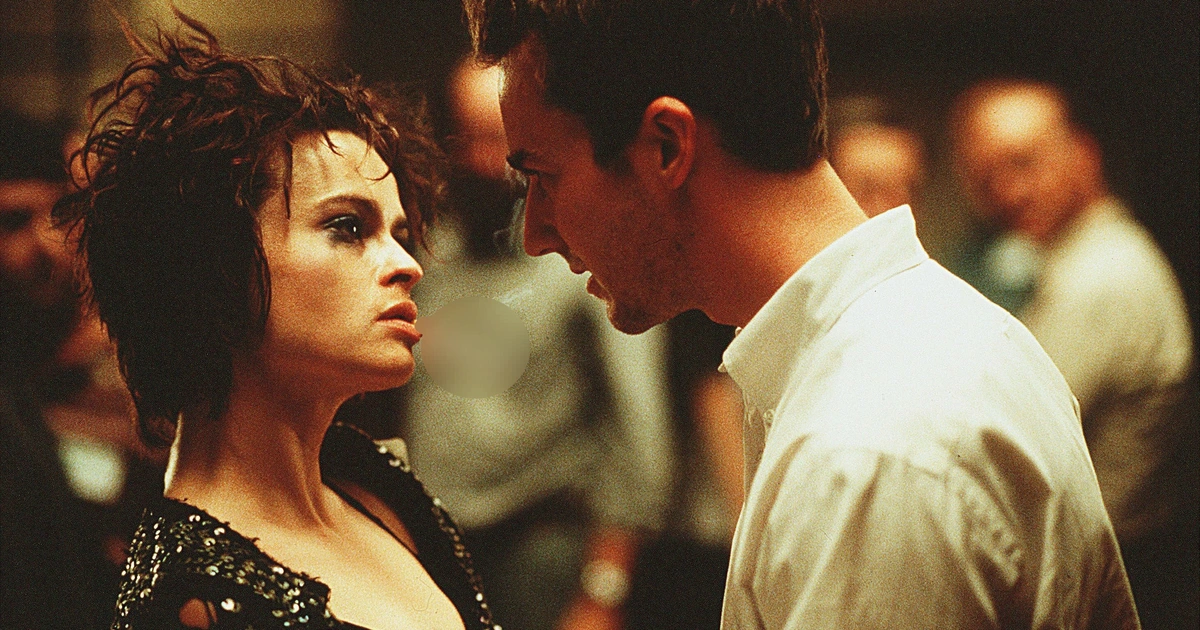
Building on the critique of consumerism, Fight Club further explores the themes of materialism and disillusionment, illuminating the devastating effects of a life centered on possessions. This materialism critique is a stark commentary on societal emptiness, painting a grim picture of a society engrossed in consumer culture.
Here’s what Fight Club tells you:
- Material possessions don’t equate to happiness.
- There’s an undercurrent of disillusionment in the pursuit of wealth.
- Our obsession with materialism can lead to a loss of identity.
- Advertising fuels the cycle of consumerism and dissatisfaction.
- The societal emptiness we feel is perpetuated by our materialistic tendencies.
The Masculinity Debate in Fight Club
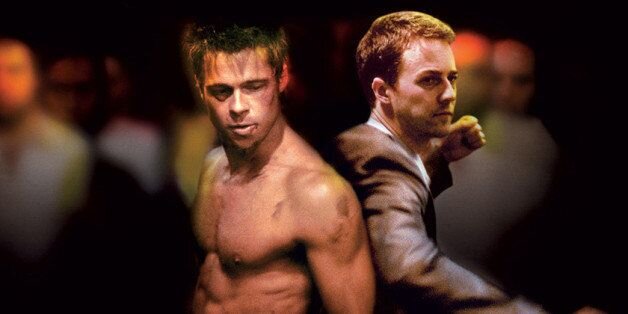
Pushing beyond its critique of materialism, Fight Club also dives into a compelling exploration of masculinity and its complexities, sparking a debate that continues to resonate with audiences today.
The film peels back layers of toxic masculinity, revealing the damage it can cause. It’s not just about men fighting; it’s a critique of gender stereotypes that bind and limit. You’re challenged to question the traditional expectations of manhood, to see the struggle with identity, the frustration of fitting into society’s mold.
Fight Club offers no easy answers, but it forces a conversation, makes you face uncomfortable truths. It doesn’t glorify toxic masculinity, it exposes it, showing the high price paid for adhering to harmful, outdated norms.
Fight Club’s Perspective on Manhood
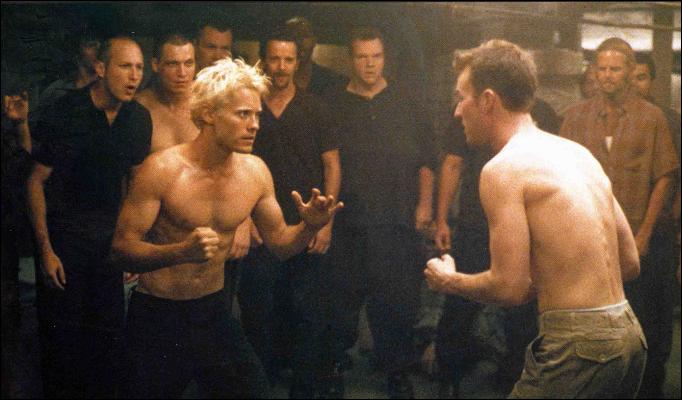
Peeling away the machismo and bare-knuckle brawls, Fight Club presents a raw, unflinching look at manhood, forcing you to confront the harsh realities of societal expectations and their impact on the male psyche. Exploring masculinity in a way that’s seldom seen in mainstream media, it pulls no punches:
- It questions societal expectations in Fight Club, asking what it truly means to be a ‘real man’.
- The film highlights toxic masculinity, showing the harm it can cause to both individuals and society.
- It’s a stark look at the identity struggle in Fight Club, a painful journey to self-discovery.
- The characters grapple with their place in a world defined by materialism.
- It underscores the emptiness of a consumer-driven life, ultimately suggesting a return to primal instincts as an antidote.
Satirizing the Self-Help Industry
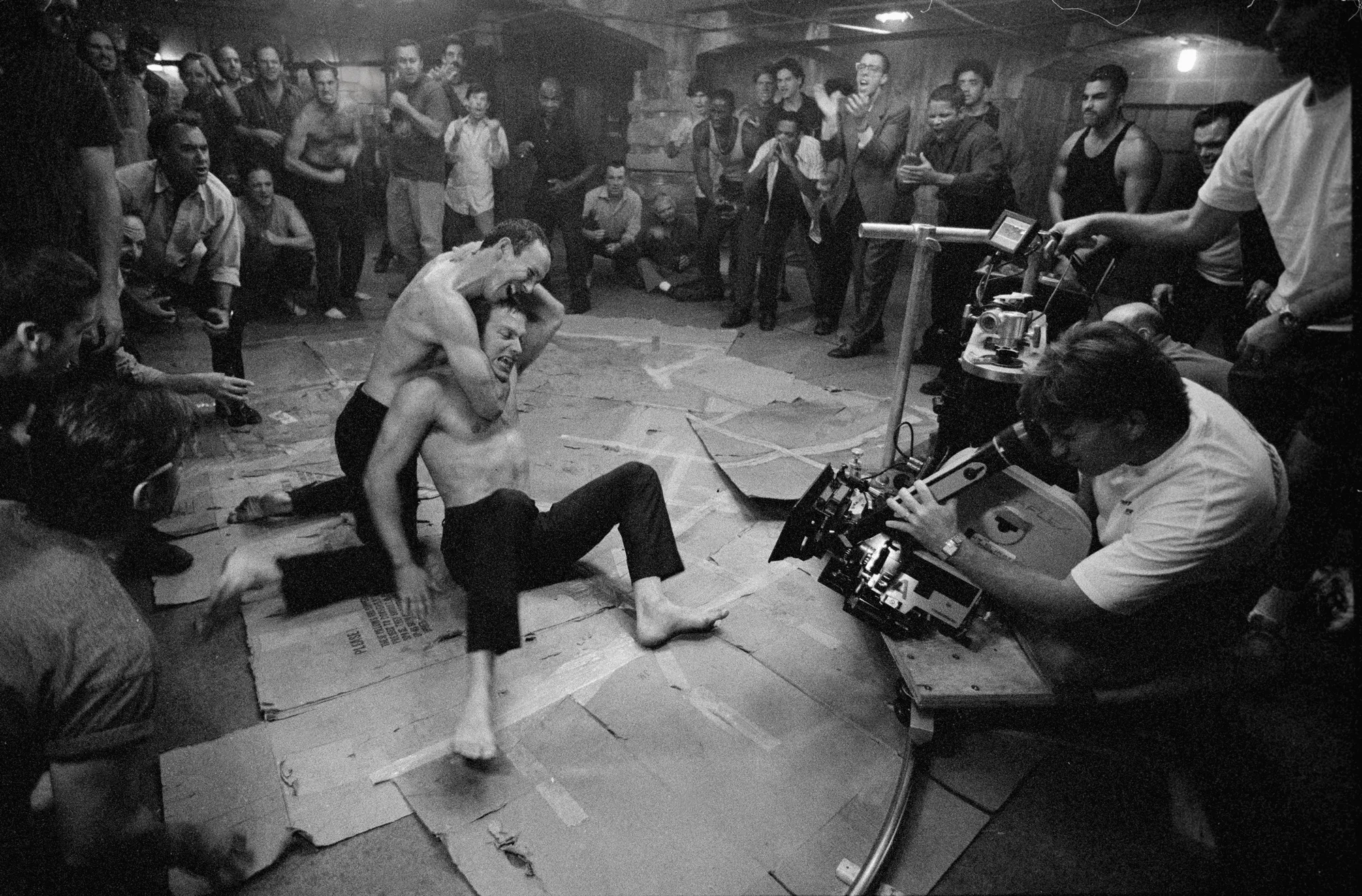
Diving headfirst into the murky waters of the self-help industry, Fight Club boldly lampoons its quick-fix solutions and oversimplified advice, prompting you to question the authenticity of these so-called gurus and their methods.
It’s a self-help satire, a sharp jab at the industry’s promise of instant transformation. The film exposes the hollow core of this industry mockery, shining a spotlight on its empty promises and superficial wisdom.
The protagonist’s journey serves as a critique, underlining the misguided pursuit of self-improvement through consumerism. Fight Club’s irreverent treatment of the industry is a reminder that true change and fulfillment can’t be bought or achieved through easy formulas.
It’s a wake-up call, nudging us to think deeper, beyond the glossy veneer of self-help books and motivational talks.
Unmasking the Dark Side of Self-Improvement

Unmasking the dark side of self-improvement, Fight Club pulls no punches in revealing the pitfalls and dangers of a blind pursuit of personal betterment. You’re guided through a narrative that deconstructs improvement, exposing self-help pitfalls that often go unnoticed:
- The illusion of quick fixes: Beware of ‘magic bullets’. True growth takes time.
- The danger of over-reliance: You can’t outsource your happiness or self-worth.
- The trap of materialism: More possessions won’t make up for a lack of purpose.
- The risk of conformity: Don’t lose your identity in the pursuit of ‘normal’.
- The deception of gurus: Question everything. Even this.
In shedding light on these areas, Fight Club offers a stark, yet enlightening critique of the self-help industry.
Fight Club’s Rebellion Against Authority

Continuing our exploration of Fight Club’s thought-provoking themes, let’s now turn our attention to its profound rebellion against authority.
You’ll find that this narrative is rife with authority defiance, serving as a critique of rigid power structures.
The members of the Fight Club, led by the enigmatic Tyler Durden, reject societal norms and the confines of their mundane lives.
They’re drawn to the chaos, the freedom, the rebel individualism that the club offers.
It’s not just about fighting; it’s a symbolic act of resistance, of reclaiming agency.
The raw, visceral fight scenes are a manifestation of this revolt.
The Anti-Establishment Message of Fight Club
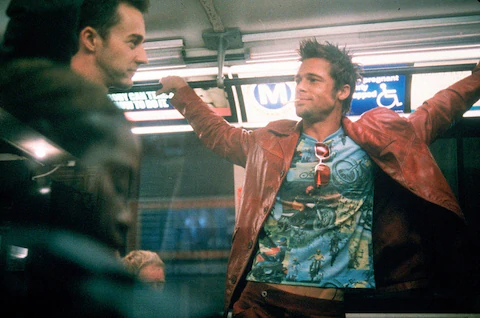
Beneath its fist-flying surface, Fight Club delivers a powerful anti-establishment message that’s sure to captivate your attention and make you question the very fabric of society. It screams rebellion and defiance, championing individualism and liberation from societal norms.
- The Fight Club, our protagonist’s brainchild, symbolizes rebellion against a society steeped in materialism.
- It advocates for defiance against a system that suppresses individuality.
- The film glorifies liberation from societal chains, fueling the desire to break free.
- Fight Club’s actions represent a drastic, albeit destructive, form of individualism.
- It embodies an anti-establishment ethos, challenging you to question the status quo.
Fight Club doesn’t just entertain; it shakes you to your core, urging you to reevaluate your perceptions of society, self, and the world.
Fight Club’s Influence on Pop Culture
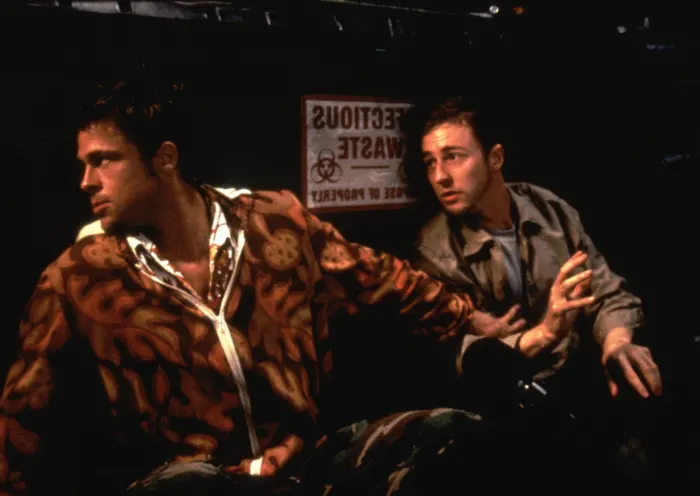
Beyond its groundbreaking narrative, Fight Club has left an indelible mark on popular culture, influencing a generation of filmmakers and sparking societal discourse. Its unique blend of raw emotion, provocative themes, and stylistic innovation has earned Fight Club cult status among cinephiles and general audiences alike.
The film’s approach to storytelling, with its nonlinear structure and psychological insight, has had a significant impact on filmmaking, inspiring directors to push boundaries and explore new narrative techniques. Quotes like ‘The first rule of Fight Club is you don’t talk about Fight Club’ have infiltrated everyday conversations, demonstrating its pervasive influence.
Fight Club isn’t just a film; it’s a cultural phenomenon that continues to shape our collective consciousness.
Societal Discontent Reflected in Fight Club

Peeling back the layers of Fight Club, you’ll find a mirror held up to our society, reflecting the deep-seated discontent, disillusionment, and frustration that permeate modern life. As a societal reflection, Fight Club embodies our modern discontent, unmasking the raw truth of our societal dissatisfaction.
- The fight club itself, a primal escape from the sterility of corporate life.
- The anti-consumerist messages, a direct attack on our culture’s obsession with material possessions.
- The dissection of masculinity, a commentary on gender roles and expectations.
- The revolt against societal norms, a call for individualistic freedom.
- The satire of the self-help industry, a cultural reflection of our search for easy answers.
In Fight Club, you’re seeing more than a film; you’re seeing a mirror.
Conclusion
So, you’ve witnessed Fight Club’s brutal critique of self-help, a mirror reflecting the emptiness of quick-fix solutions.
Remember the scene where Tyler Durden’s homemade soap sells for $20 a bar? It’s a biting metaphor for the self-help industry’s inflated promises.
Fight Club lays it bare, questioning the value we place on self-improvement. It’s time to question, not just consume.
After all, aren’t we more than just walking, talking self-help manuals?